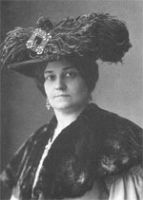Emma Adler
Emma Adler belonged to the pioneers and co-founders of the Austrian labour movement and was dedicated to the education of the working class youth with hard and soul.
Emma Adler originated from the liberal, hungarian-jewish family Braun. She grew up as the only girl among five brothers, thereof Heinrich and Adolf Braun were important social democratic journalists and politicians. The family settled down in Vienna during a flow of immigration in the 1870’s.
She was educated privately and learned French, English and Italian, Russian later on and she was an outstanding sportswoman. She worked as a translator and foreign language correspondent. Her contemporaries fancied her beauty.
At the age of 20 Emma married Viktor Adler who stemmed from a bourgeoise family – later founder of the Austrian Social Democratic party – and moved with him into the palace of Viktor’s father.The couple had 3 children, Friedrich, Marie and Karl Adler.
Emma understood her role as a political, publicly acting woman. Party politically she took a back seat – defined herself as an “emotional socialist”. She worked for the magazine “Gleichheit” (Equality) and later for the “Arbeiter Zeitung” (Workers’ Journal):
The couple’s political engagement as well as their advocacy for politically haunted individuals ended in financial discrepancies with the Adler family. Emma Adler couldn’t bear the relocation to a smaller apartment and the political pressure peaking in house searches and the imprisonment of her husband. Around 1889 she collapsed and recovered only after three years of illness.
In 1890, Viktor Adler had to serve his 4 months’ sentence imposed on him because of anarchistic activities, starting on February 17 action of the social democrats took place. It was during this time when the social democrats held their first day of action (May 1, 1890) where they went on strike and claimed an 8 hour working day. This day proceeded peacefully in spite of the negative propaganda. There Emma Adler had again the courage and – despite of her illness- the resolution to leave her children with relatives (who conjured her to attend to her duty as a mother) and to take part in the demonstration of more than 100.000 people, which she described as “brilliant and quiet”.
An article in the second „Maifestschrift“ about the false-faced behaviour of the high society und a big part of the bourgeoisie against the female workers und the claim of an eight-hour working day for female workers was confiscated. According to the prosecutor ‘a dame cannot write in that way…….’
In November 1918, after the death of her husband, Emma lapsed into a severe crisis, causing years of medical care and stays in hospitals. She moved to Zurich where her son lived and started to write her husband’s biography. However, she was not alive any more when it was published. She died on February 23, 1935 in Zurich.
The biography of her husband was only published in 1968 with the title „Viktor Adler im Spiegel seiner Zeitgenossen“ (‘Viktor Adler in the reflection of his contemporaries’).
Emma Adler is one of the co-founders and most tireless pioneers of the female workers’ movement as well as co-founder of the “Arbeiterinnenzeitung” (“female workers’ magazine”) in 1892. She edited the youth attachment of the Arbeiterinnenzeitung and publishes story books for the proletarian youth.
In the education’s association of the workers in Gumpendorf (quarter in Vienna) Emma Adler gives lectures and language courses for English and French regularily. “On average I had 90 to 120 pubils – that was an eagerness, an enthusiasm” Emma writes in the “Gedenkbuch 20 Jahre Österreichische Arbeiterinnenbewegung.” (“Memorial book for 20 years of the Austrian female workers movement”). The focus of the courses being in conversation, many of the pupils had the opportunity to find good jobs in England and America due to their good knowledge of the language.
Emma was very successful as an author and translator. She translated socio-critical work, e.g. the French maid novel “Germinie Lacerteux” by the Concourt brothers and “Gnadenbrot” (“Charity”) by Ivanov from Russian. She also wrote the first German translation of “Dangerous Affairs” by Choderlos de Laclos under the pen name “Marion Lorm”.
Her books „The famous women of the French Revolution 1789-1795“ and the “Biography of Jane Welsh Carlyle” are pioneer work of women’s history writing.
„Nothing is more difficult than being the wife of a famous man“, Emma Adler said, who is hardly recognised in women’s historiography. However, the historic magnitude of her husband Viktor and her son Friedrich are well known to all of us.
Translation: Waltraud Weichselberger
Sources:
http://www.fraueninbewegung.onb.ac.at/
http://www.dasrotewien.at/adler-emma.html http://www.rotbewegt.a
http://www.vga.at/; http://www.literature.at/viewer.alo;
Photocredits: Emma Adler with hat, presumably around 1900, author
unknown, copyright expired. Public domain.




